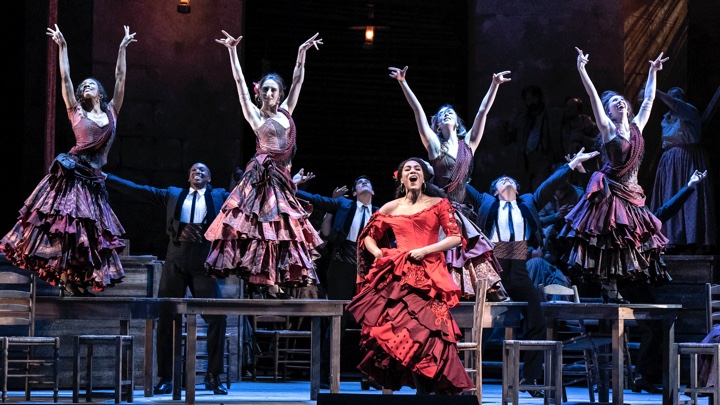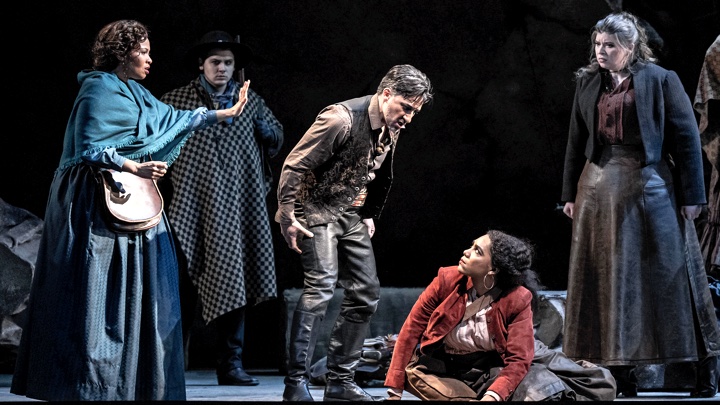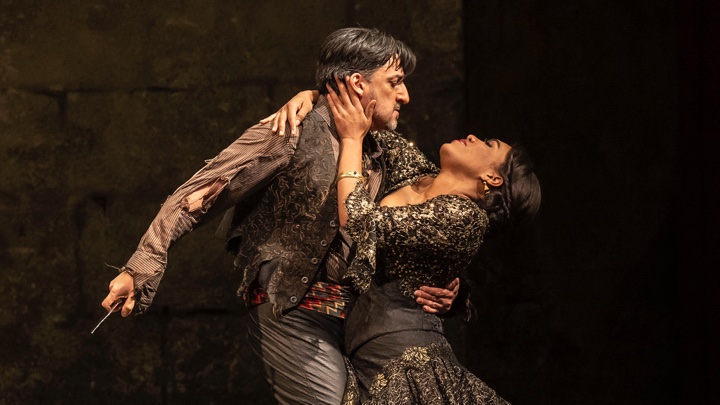
Bizet’s magnificent score contains wonderful and extensive music for chorus, and the Lyric Opera Chorus under Michael Black did remarkable work, singing and acting with beauty and precision. The chorus, whether portraying soldiers, cigarette girls, or mountain vagabonds, contributed greatly to setting the mood and atmosphere of each of the four varied acts.
Combined with the children’s voices of Uniting Voices Chicago under Josephine Lee, the chorus kept the action of Act One moving forward with drive and purpose. They contributed mightily to the story telling under the direction of Marie Lambert-Le Bihan. Black and his chorus are a real treasure for Lyric Opera, and in this Carmen should have equal billing with the principal singers.
Ryan Opera Center alumna J’Nai Bridges is building a distinguished international career and Carmen has become a signature role. With her rich chocolaty mezzo and her physical beauty, she has all the attributes to make a perfect candidate to play the sultry Roma beauty of the opera. (Lyric has wisely removed all the “gypsy” references in the libretto, replacing it with Roma or Romi).
It was odd then to see her first entrance and her Habanera strangely underpowered, with choppy phrasing and breaths taken in odd places. She seemed, frankly, not fully warmed up, and her sultry gesturing seemed all external and not embodied. But happily, things seemed to “click” by the end of the first act, and she moved from strength to strength in the following acts.
Bridges emphasizes the character’s urgent need for freedom over external sexiness, and it works splendidly, especially in the harrowing fourth act where she literally dies in order to be free of Don José. This also answers the perennial Act Four question: Why does Carmen stay behind with José instead of proceeding to watch Escamillp’s triumph? Here, it seems she stays behind to try to make José understand that she can’t be owned. Bridges and Lambert-Le Bihan do an excellent job of making this convincing.
Tenor Charles Castronovo played an unusually strong Don José and never seemed the “mama’s boy” sometimes portrayed. He sang magnificently throughout, and his Flower Song in Act Two was the highlight of the afternoon capped by a gorgeous pianissimo on the final note. I thought the character might have been more desperate in Act Four, as the final violent act seemed to be almost calculated, but his was a thoroughly admirable performance.
Lyric debuting soprano Golda Schultz was a sweet and delicate-voiced Micaela, singing with limpid beauty and vulnerability. And yet, she showed her backbone in the mountain scene when she was decisive and strong, never cowering in fear. Let’s hear more of this soprano in future Lyric performances.
There was one serious casting mistake—the Lyric debut of Andrei Kymach as Escamillo. His baritone was a size too small for the cavernous Lyric Opera house, and his stiff rendition of the Toreador Song lit none of the expected fires. He also seemed isolated, never really connecting with the other characters.
The smaller roles were aptly handled by Ryan Opera Center members. Denis Velez as Frasquita and Katherine DeYoung as Mercedes were a delight, especially in their fortune-telling scene in Act Three, where their voices blended beautifully. Wm. Clay Thompson was a strong voice and presence as Zuniga, and Baritone Ian Rucker sang an excellent Morales.
Production values were excellent. Robin Don designed marvelous sets, especially for Act Three, utilizing tall rocky promontories overshadowing the mountain set. Robert Perdziola’s costumes were colorful and beautiful, especially those for Carmen. Her black and gold gown for the fourth act was breathtaking. Chris Maravich’s lighting was luminous and bright for the sun-splashed scenes, but was too dark for the night scenes where we had a hard time making out the singer’s faces.
The Lyric Opera Orchestra brought Bizet’s score to vivid life, playing with sensitivity but fully capable of powerful climaxes. Conductor Henrik Nanasi’s work at Lyric has been controversial, and here was no exception. I quite liked the drive and forward motion he contributed to the score, and he also allowed for nuance in the quieter moments. His tempi were, however, often too fast or too slow, and the coordination with the singers had a couple of shaky moments. It seemed the conducting was a bit too moment-to-moment and didn’t provide an overall arc to the performance.Stage Director Marie Lambert-Le Bihan told the story clearly, handling the large group scenes especially well. There was a very exciting moment at the beginning of the third act, when all the chorus were sleeping and looked literally like part of the mountain. Then, slowly, an arm was lifted and the singers gradually came to life. It was visually stunning. On the other side, it was risible when Carmen rolled up the sleeves of her gown as if she was about to punch José in Act Four. Seriously?
It was a generally well sung and audience-pleasing afternoon at the opera. I’m anxious to see Lyric’s return to risk-taking new work when Proximity opens next week.
Photos by Todd Rosenberg





